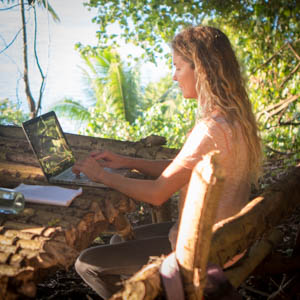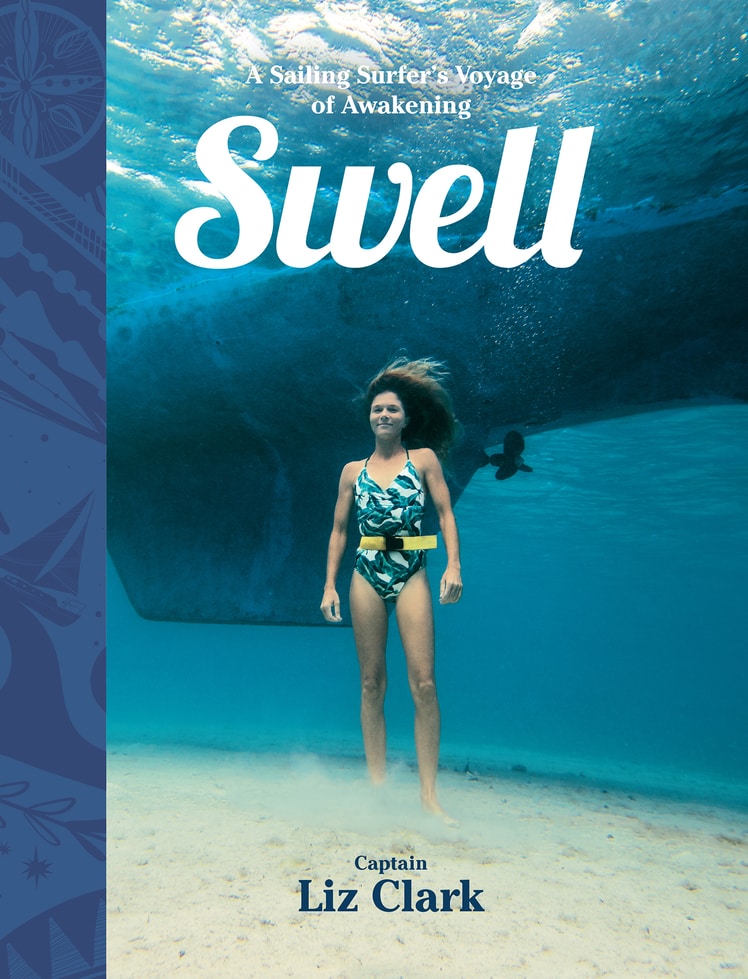‘Raaou Tahiti’: Respecting Our ‘Roots’

The Mami 'taote' (doctor) and her pet shark, Tamaro.
When the Lau family caught wind of my ciguateric state, they quickly reported the news to ‘Mami’, their Tahitian grandmother who was rich with knowledge of traditional Tahitian medicine or ‘raaou Tahiti’.
Twice the first day, and once for the following three days, ‘Mami’ prepared the local remedy for me to drink. Despite its unappealing pea-green color and potent taste, I sucked down each glass, willing to try anything that would take away that terrible muscular pain. She explained that I would be able to eat fish in a few weeks rather than a few months like those who don’t drink the ‘raaou’.
…When finally I felt well enough to make my way over to thank the Mami, and find out what exactly I had been drinking…

The ciguatera 'raaou' ingredients…
She explained that the remedy called for three ‘free-standing’, above-ground pandanus roots and the bottom half of a large, mature coconut. As the pandanus plant grows taller, it pushes new roots out from its trunk, which grow down in the direction of the ground. These roots, before they reach the ground, are those that are cut from the trunk to prepare the ‘raaou’, at about a forearm’s length each. She then took one large mature coconut, and after shucking the husk and splitting it in two, using only the bottom half (the part without the three holes) to grate and press into coconut milk. Next she skinned the roots and pounded them flat with a hammer, and finally twisted each one until its brownish-green sap dripped down into the coconut milk.
I was fascinated by the process. I’d spoken with a French doctor in Tahiti who told me to take calcium tablets, but if I had none, I should eat a lot of cheese. But he’d obviously never had ciguatera, because the Mami was horrified when she found out I had been eating lots of cheese, as the animal protein in cheese exacerbated ciguatera symptoms. The Lau’s couldn’t understand why I wasn’t getting better quicker…alas, it could have been the cheese!
It’s part of coming from western civilization to naturally think that we have all the answers; that modern science always knows better. This situation was a good reminder to respect local knowledge, especially that of the elders who lived here before there were planes and French hospitals. It seemed both tragic and scary, that in maybe just one more generation, traditional Tahitian medicine might virtually disappear. There seemed to be a scarce few locals interested in learning from the elders. And unfortunately, modern science doesn’t seem to help–often turning up its nose to local knowledge, when with respectful collaboration of information everyone would win…
But change is inevitable, the world is getting smaller and smaller, and more and more homogenized. But with a little attention and respect for the past, hopefully we can carry some of the best of the old ways forward.




6 Comments
Bill Humphreys
September 6, 2011Liz,
I am so happy that you will be surfing again soon. Wouldn’t it be wonderful if some native students got a grant, film and computers to go visit the remaining ‘doctors’ of tribal medicine to record all that they would share? I think a white guy like myself would meet with much resistance to sharing information. The language would have to be translated too. It should be a worldwide project. We already know that destroying rainforests and their creatures is destroying cures for the diseases we have. Modifying oil with chlorine to make new chemicals that do not occur naturally is not the answer to naturally occurring diseases. You can feel the difference in natural based and manufactured vitamins. Man made diseases, like the new strains of staff infections grown in our hospitals, is just germ warfare inflicted by our ‘well meaning’ doctors, hospital owners, pharmaceutical industries, and government researchers. One wonders when our governments will change from protecting us with care of those alive rather than by ‘conquering’ those ‘other guys’ either physically or economically.
Victor Raymond
September 6, 2011Liz, good pun. It took a while to sink in. Yes, much to be learned from indigenous cultures. If you practice Yoga you may have also heard of Ayurveda (knowledge of life) or Vedic medicine. It is catching on in a big way in the US due to it’s emphasis on balance and prevention.
Enjoy!
Mike
September 10, 2011Hi Liz. I agree with Bill in principle but suggest an alternative. I wonder if the elders might be interested in being helped to self-publish some of their wisdom. That way they could actually reap the benefits themselves. Say, maybe a book, magazine, or even a website?
Thanks for the blog btw. I’m a dreamer and your posts bring me to places and people and activities that I’ll never see in person. It’s generous of you and much appreciated.
MR TIMOTHY CHARRON
September 18, 2011WELL SAID LIZ THANKS
Morgan Cloones
October 8, 2011Conventional medicine, alternative medicine, traditional medicine… Let’s face it – it’s all by the by: if it makes you better – whether it’s been dug up by a shaman or formulated in a lab – it’s medicine.
Kathy
January 16, 2012Love the idea of a pet shark! Also, the ciguatera remedy could be useful here in the Caribbean.